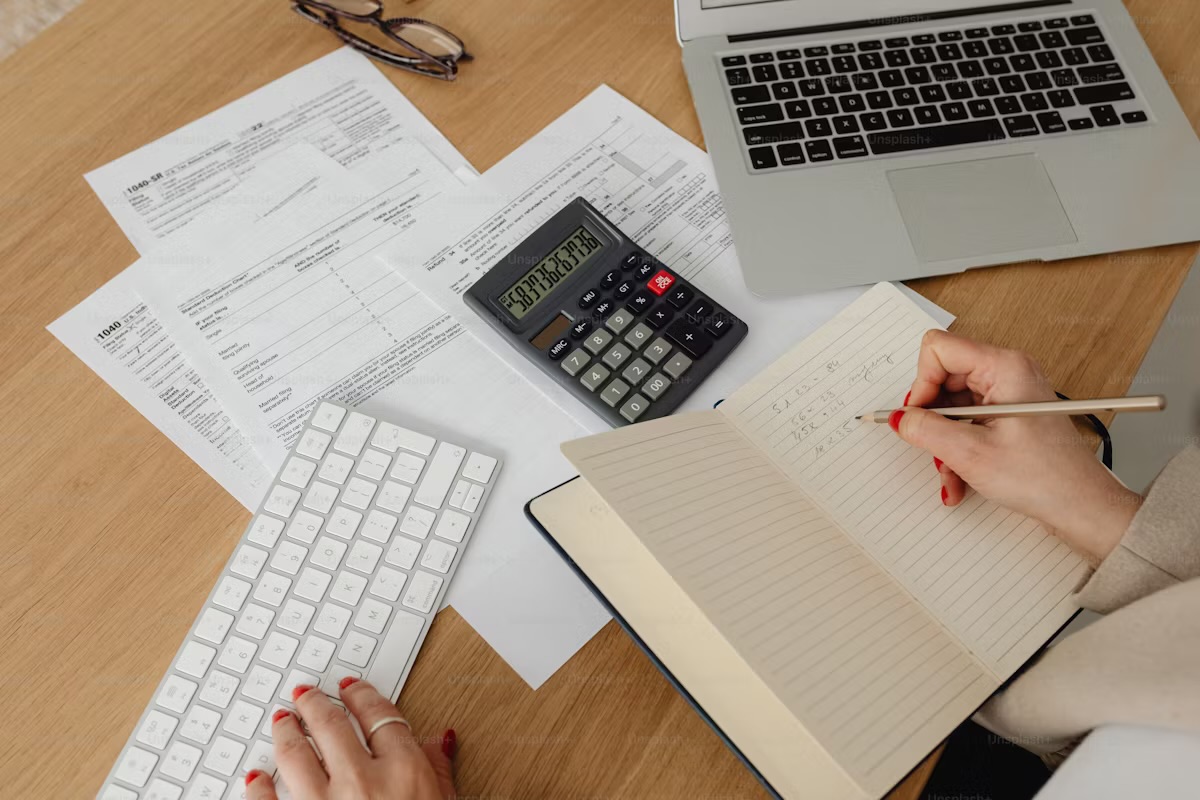
If you’re a freelancer working from home, here are Tax Deductions Every Freelancer Should Claim When Working from Home there’s a good chance you’re leaving money on the table come tax season. Many independent contractors focus on making money, but not enough on saving it through tax deductions for freelancers working from home.
I get it — taxes can feel like a maze of confusing forms and IRS jargon. But once you understand which expenses you can legally write off, you’ll see that it’s one of the easiest ways to keep more of your hard-earned income in your pocket. The beauty of being self-employed is that you have control not just over your schedule, but also over how you manage your money. And the IRS gives you plenty of opportunities to save through home office tax deductions and other perks designed for people just like you.
tax deductions for freelancers working from home
Today, we’re going to walk through the most valuable freelancer tax write-offs you can claim, especially when your office is just a few steps away from your kitchen. Each of these is legitimate, easy to claim, and fully backed by the IRS — as long as you keep records and understand the rules.
.
Home Office Deduction
One of the most popular work from home tax savings opportunities is the home office deduction. If you use part of your home regularly and exclusively for business, you may be able to deduct related expenses. This includes a portion of your rent or mortgage, property taxes, and even maintenance costs.
The IRS offers two methods: the simplified option, which is a flat rate per square foot, and the regular method, where you track actual expenses. You can check the details on the IRS home office deduction page.
If you’re claiming this, make sure your space is dedicated only to work. Turning your dining table into a part-time office won’t count — the IRS is strict about the “exclusive use” rule.
If you own your home, mortgage interest and property taxes can be partially deductible for your office space. Before making the leap to buying, read Homeownership in 2025: Smart Move or Expensive Mistake? to see if it’s the right move for you.
.
Internet and Utilities
If you run your business from home, chances are your internet connection is just as essential as your coffee maker. The good news? A percentage of your internet bill, as well as electricity, heating, and water, can be counted as deductible expenses for freelancers.
For example, if 20% of your home’s total space is used for business, you can deduct 20% of your utilities as a freelancer business expense. This is one of the easiest self-employed tax deductions to claim because you already have monthly bills and payment receipts as proof.
.
Office Equipment and Supplies
Laptops, printers, software subscriptions, and even pens can be written off as home office equipment tax breaks or supplies deductions for freelancers. If you buy something you use solely for your business, you can generally deduct the full amount.
For more expensive items like computers or cameras, you may qualify for a depreciation deduction for office equipment, allowing you to spread the deduction over multiple years. This is especially helpful for freelancers who invest in high-end tools to do their work.
.
Phone Bill Deduction
If you use your phone for client calls, video meetings, or even checking business emails, part of that bill can be deducted as a phone bill deduction for freelancers. The same rule applies here as with utilities — you can only claim the portion of your phone usage that’s for business.
Let’s say you use your phone about 70% of the time for work and 30% for personal calls. You can write off 70% of the bill under freelancer tax write-offs. It’s an easy win and one that’s often overlooked. Just keep your usage records in case the IRS asks for proof.
.
Software and Subscriptions
Whether it’s accounting software like QuickBooks or design tools like Canva, anything you pay for to run your business can be deducted as software subscription tax deductions. This also covers online project management tools, video conferencing platforms, and even paid cloud storage.
Since so many freelancers use specialized software to deliver their services, these costs can add up quickly. Every subscription that’s work-related is another legitimate work from home deduction to lower your taxable income.
.
Marketing and Advertising
If you spend money promoting your freelance business, you can deduct it. That includes marketing and advertising tax deductions for things like social media ads, business cards, paid listings, or even your website hosting and domain tax deduction.
The beauty of this category is that it doesn’t just cover flashy ad campaigns. If you sponsor a local event to get your business name out there, that counts too. Basically, if it’s money you spend to bring in clients, it’s probably deductible.
.
Professional Services
If you’ve ever hired an accountant, bookkeeper, or even a lawyer to help with your business, you can deduct those costs as professional service expenses for freelancers. The IRS allows you to write off any professional help that’s directly related to running your business.
So if your accountant prepares your taxes, sets up your bookkeeping system, or advises you on business deductions, their fee is a legitimate self-employed business expense. The same goes for legal consultations about contracts or trademark protection.
.
Education and Training
Investing in your skills isn’t just good for your business, it’s also a deductible expense. This includes online courses, workshops, and certifications that directly relate to your freelance work. These are considered education deductions for freelancers under IRS rules.
For example, if you’re a freelance writer taking a course on SEO, or a graphic designer learning new design software, you can claim those costs. Keep receipts from platforms like Skillshare or Udemy as proof.
.
Travel Expenses
When work takes you away from your home base, the money you spend can often be deducted. This includes freelance travel tax deductions for airfare, train tickets, lodging, and even meals while you’re on business trips.
The key is that the travel has to be for business purposes. Visiting a client, attending a conference, or meeting with a potential collaborator all count. The IRS also allows you to deduct mileage if you use your car for work, which falls under vehicle deductions for freelancers.
.
Business Insurance
If you pay for insurance to protect your freelance business, those premiums can be deducted as a business insurance tax write-off. This might include professional liability insurance, general business insurance, or even specialized coverage for your industry.
The IRS treats these as deductible expenses for freelancers because they’re directly tied to keeping your business safe. Whether it’s protecting you from client disputes or covering your equipment, this deduction can be a valuable one.
.
Home Office Furniture
If you work from home, your office setup plays a huge role in your productivity — and certain costs can be claimed as home office deductions for freelancers. Furniture purchases like ergonomic chairs, desks, filing cabinets, and shelving units are considered legitimate business expenses when they’re used exclusively for work.
If the cost of a single item is substantial, you may need to claim it over time through depreciation. However, the IRS allows certain freelancers to deduct the full amount in the year of purchase under Section 179, provided the furniture meets the eligibility criteria. For example, buying a high-quality standing desk or an ergonomic chair designed to support long work hours could be deducted in full. Keeping receipts and noting the date of purchase will make it easy to justify this deduction if ever questioned. Investing in quality furniture not only supports your health and productivity but can also lower your taxable income.
.
Health Insurance Premiums
If you’re self-employed and pay for your own health insurance, you might qualify for a health insurance premium deduction. This can include medical, dental, and vision insurance premiums. This deduction is especially helpful for freelancers since healthcare costs can be a big expense when you’re not covered by an employer. Just remember, the deduction usually applies only if you’re not eligible for coverage through another job or a spouse’s plan.
.
Memberships and Professional Associations
Freelancers often underestimate the value — and the tax benefits — of joining memberships and professional associations. If you’re paying annual dues or one-time enrollment fees to join a group that directly supports your business, those costs are considered deductible business expenses for freelancers. This could include industry-specific organizations, online networking communities, or even local chambers of commerce.
For example, a freelance copywriter might join the American Writers & Artists Institute, while a freelance web developer might maintain membership with a recognized tech association. These memberships often provide valuable benefits like training resources, industry updates, and opportunities to connect with potential clients. When tax season arrives, you can list these fees under professional expenses, making them a smart way to both grow your business and reduce your taxable income. Just remember — to qualify, the membership must have a direct connection to your freelance work, and you should keep clear records of payments for your tax files.
.
Meals for Business Purposes
If you meet a client over lunch or grab dinner while traveling for work, you may be able to deduct those meal costs as business meal deductions. The IRS generally allows you to claim 50% of the meal’s cost if it’s directly related to your business activities.
Keep detailed notes — who you met with, what you discussed, and how it relates to your work — to support this deduction. Platforms like Expensify can help track receipts and expenses.
.
Bank and Payment Processing Fees
Running a freelance business often means paying for things like PayPal fees, credit card processing fees, or even monthly fees for a business bank account. The IRS considers these deductible business banking expenses.
While these fees might seem small, they can add up over a year. If you use platforms like PayPal or Stripe, make sure to download your annual statements so you can deduct the total fees paid.
.
Depreciation of Assets
When you buy expensive equipment for your freelance work — like a high-end computer, camera, or specialized tools — you may not be able to deduct the full cost in one year. Instead, you can spread the deduction over several years using asset depreciation for freelancers. This method can help balance your taxable income across multiple years. Your accountant or tax software can help you figure out exactly how to calculate depreciation, but it’s a powerful tool for managing large business purchases.
.
Continuing Education Subscriptions
For freelancers, staying competitive often means continually upgrading your skills — and many do this through ongoing training subscriptions. Platforms like LinkedIn Learning, Skillshare, or trade-specific knowledge hubs can be fully deductible as professional development expenses for freelancers. These subscriptions give you access to courses, tutorials, and industry insights that directly enhance your ability to deliver high-quality work to clients.
For instance, a freelance social media manager might use a subscription to learn the latest advertising strategies, while a freelance designer could take advanced classes on user interface design. As long as the subscription is related to your current freelance work or a service you plan to offer, the cost can be claimed as a tax deduction. Documenting the subscription fee, payment frequency, and relevance to your business will make it easy to claim during tax filing. This not only makes professional growth more affordable but also keeps you ahead in an increasingly competitive freelance market.
Many deductions apply to more than just traditional freelancers — remote employees can often benefit too. If you’re exploring new opportunities, check out our 15 Best Remote Jobs With No Experience for inspiration.
.
Frequently Asked Questions
Below are answers to common questions about tax deductions for freelancers working from home that you may be interested in.
How much can a freelancer write off for a home office?
The exact amount a freelancer can deduct for a home office depends on the calculation method used. The simplified method lets you deduct $5 per square foot of office space, up to 300 square feet. This means the maximum deduction under this method is $1,500 per year. The regular method involves calculating the percentage of your home used for business and applying that percentage to eligible expenses like rent, mortgage interest, utilities, and property taxes. For example, if your home office takes up 10% of your living space, you can deduct 10% of qualifying costs. Keeping detailed records of these expenses is critical in case of an IRS audit.
.
What expenses can be deducted for a home office?
Common deductible expenses include a portion of your rent or mortgage interest, utilities like electricity and water, internet service, home insurance, and maintenance costs directly related to your workspace. Office-specific expenses such as furniture, equipment, repairs to the workspace, and office supplies are also deductible. However, the IRS requires that the space be used exclusively and regularly for your freelance business, so a dining table or shared living area usually doesn’t qualify unless it’s solely dedicated to your work.
.
What is the 20% self-employment deduction?
The 20% self-employment deduction, officially called the Qualified Business Income (QBI) deduction, allows eligible freelancers and self-employed individuals to deduct up to 20% of their net business income from their taxable income. This deduction is available to many independent contractors, sole proprietors, and small business owners, but there are income thresholds that affect eligibility. For 2025, if your taxable income is under a certain limit (adjusted annually), you can typically take full advantage of the deduction. It’s a significant benefit because it directly reduces the amount of income subject to federal taxes.
.
Can I write off my rent if I work from home?
Yes, freelancers who rent their homes can deduct the portion of rent corresponding to the percentage of space used for their home office. For example, if your office occupies 15% of your home, you can deduct 15% of your monthly rent as a business expense. This deduction applies only if your home office meets IRS requirements for exclusive and regular business use. Utilities and renter’s insurance related to that space can also be partially deducted.
.
Can I deduct my internet if I work from home?
Absolutely. If you rely on the internet for your freelance work—whether for client communication, research, marketing, or project delivery—you can deduct the portion of your internet bill that applies to business use. If you use it 80% of the time for work, then 80% of your monthly cost is deductible. Like your phone bill, you should document usage patterns and keep billing records to substantiate your claim.
.
Can freelancers deduct business expenses without receipts?
Yes, but it’s risky. While the IRS doesn’t require receipts for expenses under $75 (except lodging and certain travel expenses), having proper documentation is always safer. Bank statements, credit card statements, invoices, or a detailed logbook can serve as proof of the expense. For larger deductions, receipts are essential to avoid losing the deduction during an audit.
.
Tax Deductions Every Freelancer Should Claim When Working from Home — summary
I hope you enjoyed my article on Tax Deductions Every Freelancer Should Claim When Working from Home.
Working from home as a freelancer offers a lot of freedom, but it also comes with the responsibility of keeping your finances in order — and that includes making the most of the tax deductions you’re entitled to. From the home office deduction and utilities to internet, equipment, and the 20% self-employment deduction, these write-offs can significantly reduce your taxable income and keep more money in your pocket. The key is understanding what qualifies, keeping accurate records, and knowing whether the simplified or regular calculation method works best for you.
Many freelancers overlook deductions because they either assume they’re too small to matter or they’re afraid of making a mistake. But small amounts add up quickly over the year — and every deduction you claim legally is money that stays in your business rather than going to the IRS. By taking the time to track your expenses, save receipts, and consult reputable tax resources or a qualified tax professional, you can confidently claim the benefits you’ve earned. The truth is, tax season doesn’t have to be stressful if you prepare for it all year long. Keep your business and personal expenses separate, maintain organized records, and review your deductible items regularly. When you approach your finances with intention and strategy, you’ll not only reduce your tax bill but also strengthen your business’s long-term financial health. In short — know your deductions, use them wisely, and you’ll see the results in your bottom line.



